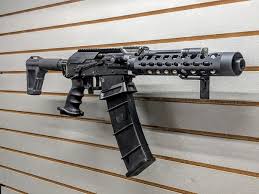The national firearms act (NFA) was enacted in 1934, was a crucial piece of legislation in the United States designed to regulate specific types of firearms and the related equipment. This act was a response to the widespread usage of automatic weapons by criminals in the Prohibition era, aimed at curbing violence by controlling the availability of dangerous firearms.
What is the NFA?
The NFA primarily targets specific types of firearms, including machines guns, short-barreled firearms (SBRs) and short-barreled shotguns (SBSs) as well as suppressors (also called silencers) and destructive devices like bombs and grenades. In addition, it covers other weapons (AOW), a category that includes various disguised or novel weapons.
Registration and Taxation
One of the most important provisions of the NFA includes the obligation for owners to register NFA firearms to the Bureau of Alcohol, Tobacco, Firearms and Explosives (ATF). The registration process includes the submission of an application, fingerprints, photographs as well as a thorough description of the firearm. This process aims to create a traceable record of ownership. This will help police in tracking and controlling the distribution of these weapons.
The NFA also has an additional tax on the manufacturing or transfer NFA firearms. The tax is $200 for all NFA items and is not applicable to AOWs that are subject to a $5 tax. This barrier to financial security was originally designed to be prohibitively expensive and discourage people from purchasing the weapons.
Compliance and Enforcement
To ensure compliance, to ensure compliance, NFA includes stringent penalties for violations. The possession of firearms without registration or transfers of NFA firearms can result in grave consequences, such as hefty fines and lengthy prison sentences. The ATF is a force for good, conducting investigations and audits to ensure compliance with the laws.
Impact and Controversy
Since its beginning since its inception, the NFA has been the subject of various legal contests and amendments. Some critics claim that it violates upon Second Amendment rights and imposes excessive burdens for citizens who are law abiding. However, advocates argue that it is necessary to ensure public safety and helps to prevent the misuse of dangerous weapons.
In 1968 in 1968, it was in the year 1968 that Gun Control Act (GCA) was introduced, which expanded the legal framework created through the NFA. The GCA required all firearms as well as NFA items, to be registered with serial numbers, making easy for the law enforcers agencies to track weapons.
Conclusion
The National Firearms Act remains a essential element of firearm regulations in the United States. While it continues to be the subject that is debated, it’s significance in regulating circulation and possession of certain kinds of firearms is undeniable. Knowing about the NFA is vital for those involved in gun ownership or advocacy, since it affects the landscape of gun rights and regulations in the United States.


